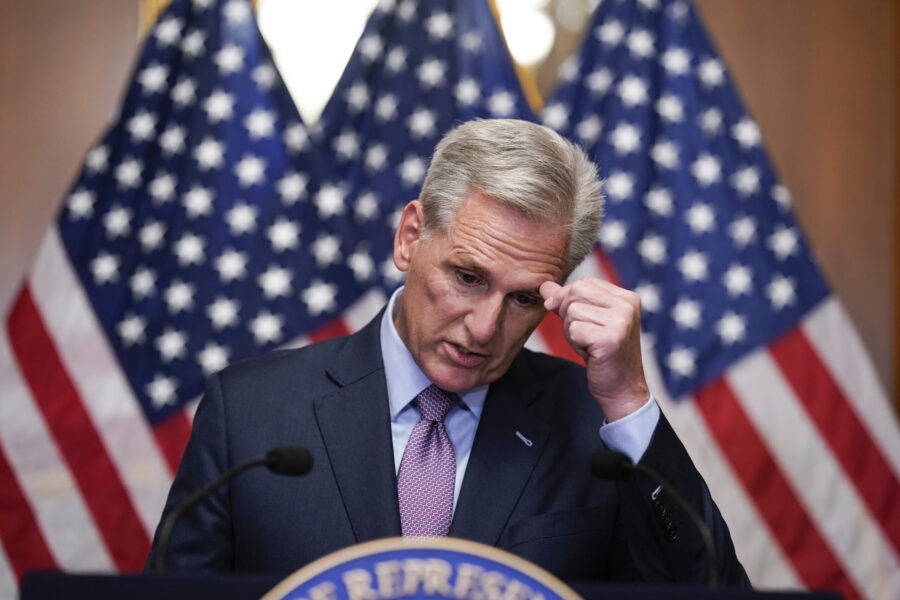
Rep. Kevin McCarthy, R-Calif., speaks to reporters hours after he was ousted as Speaker of the House, Tuesday, Oct. 3, 2023, at the Capitol in Washington. (AP Photo/J. Scott Applewhite)
Rep. Kevin McCarthy had support from 208 members of his conference to remain as House speaker. But it took only eight dissenters in his party to boot him from the job.
A handful of Republicans joined with Democrats to make history as McCarthy became the first speaker in U.S. history to be voted out of the position by his colleagues.
Most of the eight have never been members of the McCarthy fan club. They chafed at the deal McCarthy made with President Joe Biden to avoid a federal default. They voted against the bill Congress passed Saturday to keep the federal government operating at current funding levels through mid-November.
Most are also fiscal hardliners who opposed McCarthy’s candidacy for speaker early on. But, McCarthy, soon after announcing he would not seek to run again for the speaker’s job, countered that he did not view the eight as conservatives.
“They don’t get to say they’re conservative because they’re angry and they’re chaotic,” McCarthy said. “That’s not the party I belong to. The party of Reagan was if you believed in your principles, that you could govern in a conservative way. They are not conservative and they do not have the right to have the title.”
A look at the eight Republicans who voted to remove McCarthy from office, against the overwhelming wishes of their colleagues.
REP. ANDY BIGGS
Biggs is serving his fourth term in the House representing a strongly Republican-leaning district in Arizona. He is a former chairman of the hardline House Freedom Caucus. He threw his hat into the ring in the race to become speaker back in January, but won only 10 votes in the first of 15 rounds of voting.
Biggs serves on two of the committees leading up the impeachment inquiry of President Joe Biden and has long called for his impeachment. He also has been a staunch ally of former President Donald Trump and describes him as the leader of the Republican Party.
Biggs complained Tuesday that lawmakers were promised the House would pass 12 annual funding bills in a timely manner, but that wasn’t accomplished before the end of the fiscal year, requiring a stopgap spending bill to avoid a shutdown. He said the annual spending bills are critical to cutting spending and getting rid of duplicative programs.
“Why didn’t we get this stuff done?” he asked at one point in Tuesday’s debate.
“Yes, I think it’s time to make a change,” Biggs said.
REP. KEN BUCK
Buck is serving his fifth term representing a Colorado district that includes much of the eastern part of the state and some Denver suburbs. He’s got a penchant for being a wildcard as a fiscal conservative, but also someone willing to push back against party leaders when he feels like it.
Most recently, Buck has spoken out against McCarthy’s launch of an impeachment inquiry into Biden, saying that House Republicans itching for impeachment are relying on flimsy evidence.
He also has pointed to concerns about the process for approving spending and complained about stopgap spending bills like the one McCarthy came up with Saturday to keep the government running.
“We are $33 trillion in debt and on track to hit $50 trillion by 2030,” he tweeted after the vote. “We cannot continue to fund the government by continuing resolutions and omnibus spending bills. That’s why I voted to oust @SpeakerMcCarthy. We must change course to sensible budgeting and save our country.”
REP. TIM BURCHETT
Burchett is serving his third term representing a district in east Tennessee. Burchett served 16 years in Tennessee’s legislature as well as eight years as a mayor before entering Congress.
He said while explaining his vote to oust McCarthy that the House took off the whole month of August despite knowing they needed to get the spending bills done before the fiscal year ended Sept. 30.
“At some point, we’ve just got to say enough is enough, folks,” he said in a Twitter video. “I hate losing Kevin as a friend, but I worry about losing our country.”
REP. ELI CRANE
Crane represents an Arizona district. He is also a former Navy SEAL who served in the military for 13 years. In November, he defeated a Democratic incumbent, Tom O’Halleran, who had held the seat since 2017. He was the lone Republican freshman back in January to come out against McCarthy’s bid to become speaker.
“Each time our majority has had the chance to fight for bold, lasting change for the American people, leadership folded and passed measures with more Democrat support than Republican,” Crane tweeted Tuesday.
REP. MATT GAETZ
Gaetz is serving his fourth term representing a Florida district. He is a close Trump ally who filed the motion to vacate the chair, the procedure used to oust McCarthy, and he led the debate on the House floor for those seeking to pass the motion.
He was also a holdout in January when McCarthy ran to become speaker. The defining moment during that showdown came when Alabama Rep. Mike Rogers, a Republican ally of McCarthy, angrily confronted Gaetz on the House floor before being pulled back by a colleague.
Gaetz could face political repercussions for his actions, as many Republican lawmakers blame him for this week’s chaos and view him as looking out for himself rather than for the good of the party.
“Look, you all know Matt Gaetz. You know it was personal. It had nothing to do about spending,” McCarthy said. “It all was about getting attention from you. I mean we were getting e-mail fundraisers as he’s doing it.”
Gaetz said McCarthy didn’t follow through on many of the commitments he made to win the speaker’s job, and that’s what drove him.
“Kevin McCarthy is a feature of the swamp. He has risen to power by collecting special interest money and redistributing that money in exchange for favors,” Gaetz said. “We are breaking the fever now, and we should elect a speaker who’s better.”
REP. BOB GOOD
Good of Virginia won office in 2020 after GOP voters ousted the Republican incumbent, Denver Riggleman, who had angered social conservatives by officiating a gay marriage.
Good said Tuesday that back in January he helped persuade a handful of colleagues to switch their votes to present so that McCarthy could become speaker.
But Good has been harshly critical of the deal to avoid a default and voiced alarm as Republicans prepared to ensure a partial government shutdown did not occur last weekend.
He said that if you’re not willing to endure any kind of shutdown to get the changes you seek, “it’s a recipe to lose, it’s a recipe for surrender.”
“We need a speaker who will fight for something, anything, besides just staying or becoming speaker,” Good said on the House floor Tuesday.
REP. NANCY MACE
Mace is serving her second term representing a South Carolina district. She graduated from The Citadel, where she was the first female to graduate from its Corps of Cadets. She served as a state representative before coming to Congress.
Mace tweeted her vote to oust McCarthy wasn’t about ideology. “This is about trust and keeping your word. This is about making Congress do its job,” she said.
McCarthy said he called Mace’s chief of staff on Monday saying he didn’t understand how he had not kept his word. He noted that he had helped get Mace elected to Congress.
REP. MATT ROSENDALE
Rosendale is serving his second term in the House representing a Montana district. He’s a hardliner on fiscal issues who also has voted against U.S. support for Ukraine in repelling Russia’s invasion, citing what he said are more pressing security needs along the southern U.S. border.
“Our country is facing $33 trillion of debt. Our border is facing an unprecedented invasion. And instead of being energy dominant, we are now energy reliant. The House of Representatives and the American people deserve a leader who can challenge the status quo and put an end to this ruin,” Rosendale said following Tuesday’s vote.







